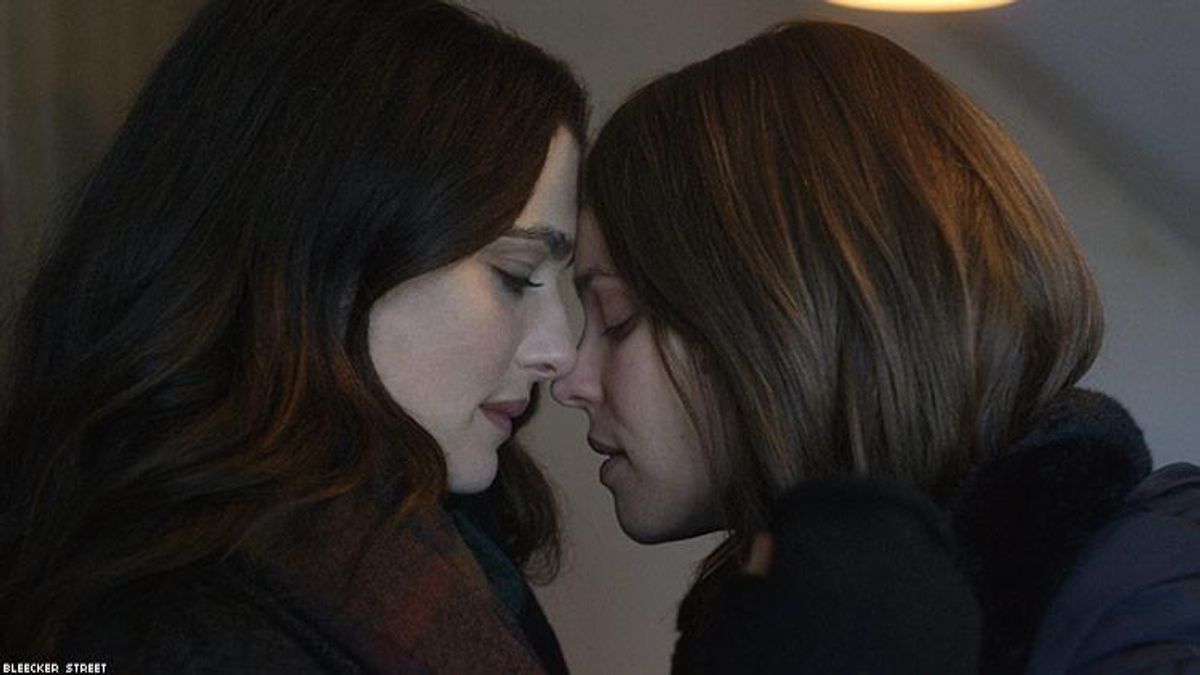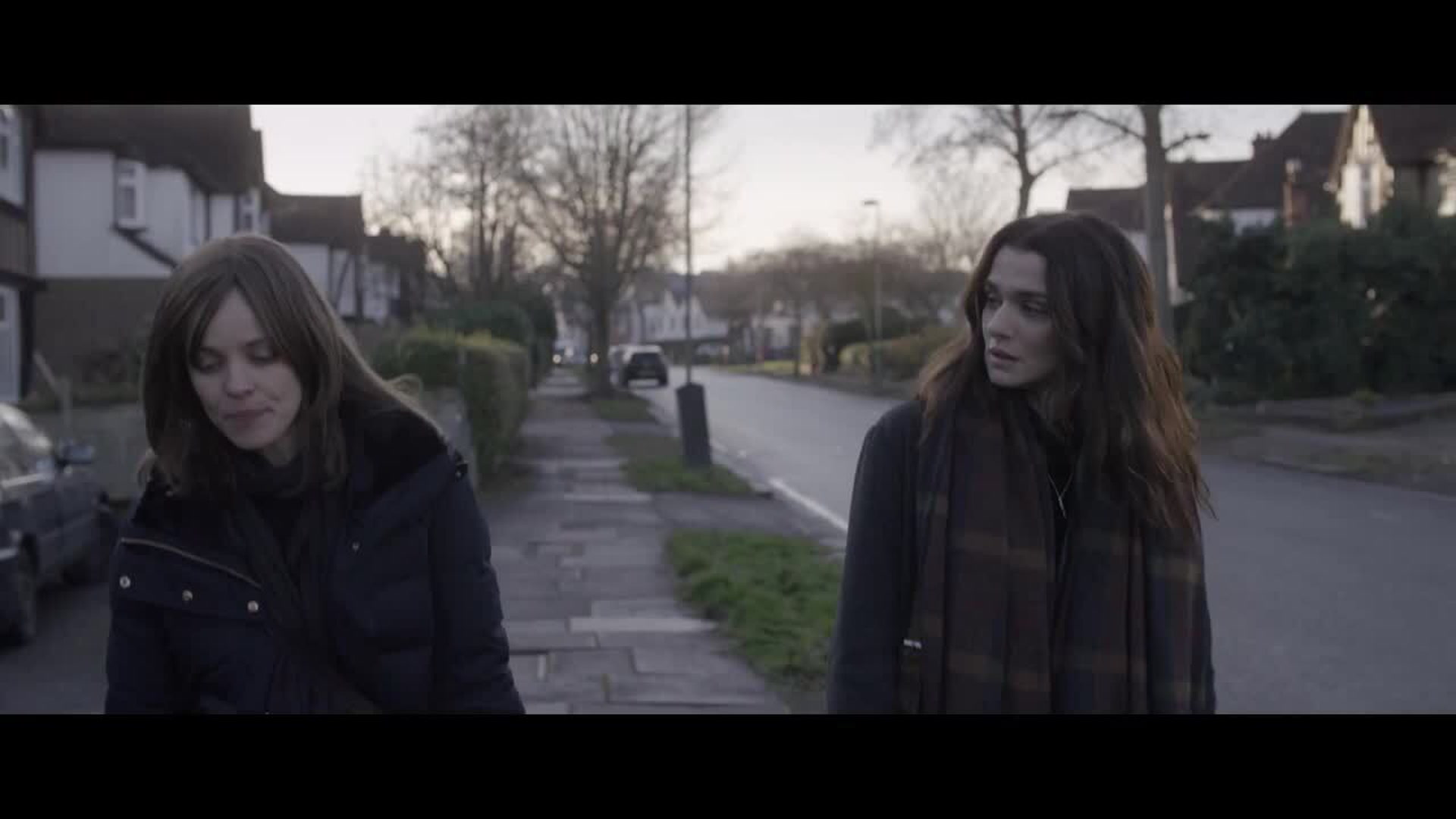"You happened to me," the character Esti, a woman hemmed in by the strictures of her North London Orthodox Jewish community in the upcoming film Disobedience, responds to Ronit, her first love. Ronit had fled the community as soon as she could. But Esti has been reunited with her following the death of Ronit's father, the rabbi. The women, engaged in the first authentic conversation they've had since Ronit's return, discuss the state of marriage -- specifically how Esti, whose passion for Ronit has been rekindled with a stolen kiss, could have stayed married to their childhood friend Dovid and remained in that cloistered world.
Esti (played with a melange of piety and burgeoning desire by Rachel McAdams) doesn't appear at first to be a paragon of female agency -- sexual or otherwise -- especially as she pawns off her reason for staying behind and marrying a man onto Ronit even as she admits she's not attracted to men. Still, it is her surprising strength of character that will drive the narrative in the film, directed by Sebastian Lelio, who helmed the most recent Oscar-winner for Best Foreign Language Film, A Fantastic Woman (the story of a transgender woman whose agency eventually blossoms).
While McAdams was busy immersing herself in a British accent and the scripture and culture of Orthodox Judaism, costarRachel Weisz, whose Ronit is at once vulnerable and wary, was spearheading the project. Having recognized the paucity of thoughtful roles for women, the Oscar-winner for The Constant Gardener now joins the growing ranks of actresses like Reese Witherspoon and Nicole Kidman (Big Little Lies) who are flexing their agency and star power to make prestige content about women.
"I was really looking for a film where there would be not just one but two female leads whose subjectivity would be really explored and present," Weisz tells The Advocate about her decision to option the rights to Naomi Alderman's 2006 novel. "I love the fact that it was a story exploring nonconformity, sexual freedom, agency, all those things. And it was set in this sort of world that isn't really our world."

Along the way to discovering and landing on Disobedience, however, Weisz entered her own kind of immersion and read the canon of classic lesbian novels.
"I was reading lesbian literature because I thought that would be the best way to ensure that both women were really important in the story and to one another," she says. Among the books she delved into were standards like Radclyffe Hall's The Well of Loneliness, Isabel Miller's Patience and Sarah, and Ann Bannon's Journey to a Woman, which "I really fell for," she says.
Finally, Disobedience won out for Weisz, who found the cultural chasms fascinating even if the North London neighborhood where the story of faith and forbidden love unfolds is only about three "Tube" (subway) stops away from where the 48-year-old actress grew up. Its simultaneous proximity to and distance from the London she'd known was part of its appeal.
"It's a world we don't know much about. It's a very private world. If it had been set in the Amish community in Pennsylvania, for instance, like Witness was back in the '80s, although it wasn't a lesbian film. Or Carol in the 1950s..." Weisz says. "Something that seems far away from you can actually seem much closer."
Orthodox Judaism was a world away from Weisz's experience. But Alderman (The Power) did grow up in that neighborhood among people like those depicted in her book and in the film. In her writing, the subject of radical faith, as it brushes up against societal/human issues that affect LGBT people, is treated with deference.
When Disobedience premiered at the Toronto International Film festival last fall, much ado was made about the film's pivotal sex scene -- the moment in which Esti lets go after years of burying her sexual identity and performing dutiful sex with Dovid (an affecting Alessandro Nivola).

Several critics at the time clung to the details of the deeply passionate scene, which includes an intimate exchange of fluid (that also functions metaphorically) that has rarely, if ever, been rendered on screen in a major film about desire between women. But the scene, ramped up several notches from any expression of passion in Alderman's novel, is integral to depicting the women's -- especially Esti's -- unadulterated desire.
"It was very important to me and to Sebastian that [desire] was at the center of the story," Weisz says. "After you've watched however many minutes of this quite repressed society where you can't express your sexuality if you're gay, when these women finally are alone together -- it [the sex scene] is incredibly important." Weisz adds that it is also the release that sets Esti on her path to claiming identity and power.
"[The scene] where Esti comes -- probably for the first time -- that orgasm, to me, is her liberation," Weisz says. "It's her kind of freedom. It doesn't just mean sex. It means so much about her agency and her self-determination."
Lelio's body of work includes Gloria as well as A Fantastic Woman, and he is fast becoming one of the great new auteurs. The director meticulously storyboarded the scene for Weisz and McAdams, the shots set up to highlight the medium of film's unique ability to capture yearning with close-ups, Weisz says.
"I'm not interested in showing body parts. I'm interested in your face and your longing, and your desire. The audience will imagine where the other woman's fingers and face and tongue is outside the frame," Weisz says their director told them. "It was our job like musicians -- if there are coordinates or notes -- to fill that with emotion, which I think we did. I hope we did."
In addition to emphasizing the significance of depicting women's empowerment in the film, Weisz acknowledges the notable lack of stories about LGBT people that make it to the screen. She says it was important for her to do justice to the women Disobedience was representing.

"So far, everyone [queer women who've seen the film] I've spoken with felt that they could identify and really connect and that it expressed something about the experience to them. They saw themselves reflected," Weisz says. "To me, there could be no greater endorsement. That's so important to me and I'm really moved."
Although it may not have been an initial motivating factor in making Disobedience, Weisz, who's starred in dozens of films dating back to the '90s that feature straight romances, says she realizes she's tired of the same old straight love stories and the male gaze.
"It can just get really boring watching heterosexual people, whether you're gay or not," Weisz says. "It's boring, particularly when the woman is the object of desire rather than the agent of desire. That's what we've been spoon-fed -- that the woman is the object of the male subjectivity, of his desire and passion. Oh, I'm bored of that. Really bored."
Whereas Esti's reawakening is possibly drastic and earth-shattering, Ronit -- a successful New York-based photographer who's returned to the enclave of her youth to reconcile her estrangement from her father, the revered Rabbi Rav Krushka, with whom she hadn't spoken for years -- quietly navigates a journey of acceptance of her past and forgiveness of the cultural forces that cast her out while moving through grief over the multiple ways her father was lost to her. But she also pushes back against the established laws of the world she left, where women dress down, hide their flesh, cover their natural hair with wigs, and engage in expected sex on the Sabbath, and she does so with the pointed if mostly reserved defiance of a woman who outgrew the strictures of her upbringing long before she got out.
Weisz, who struck out after material she not only wanted to act in but also would help shepherd to the screen, says she hadn't consciously thought about whether the story of Disobedience that appealed so much to her was inherently feminist at the time. But when asked if she thinks they made a feminist film, she says emphatically, "Yes."
"We've seen so many stories about men by men, and they're great. There are some masterpieces, but we make up half the planet, right? We're not an outlying, endangered species," Weisz says. "I love women. I love the female experience, and it's just really different to being a man, I think. I think that difference should be celebrated and thought about and put on-screen, put in books, and put in boardrooms."
Watch an exclusive clip from Disobedience below.

















































































